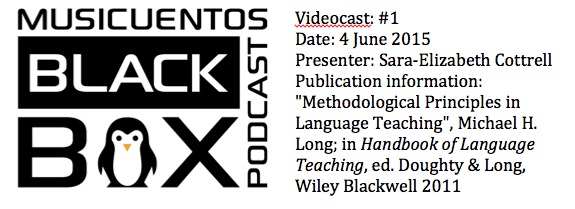If there’s one thing I’ve learned about the world language teaching profession recently, it’s that we’re plagued with arguments about why one method trumps another. As it turns out, we’re wasting our time on that argument, and we should be asking a different question altogether.
 I know, I’ve dropped off the internet a bit lately and that’s going to be the case for June at least, it seems. I’m excited for all of you getting a break at last and traveling near and far. I’m facing some pretty daunting deadlines and Camp Musicuentos and that’s pushing off my work on the next reading guide (Esperanza renace) and the blog redesign planned for this summer too. And so, it’s four days off schedule, but I did wrap up the first videocast of the Musicuentos Black Box Podcast. Give me 12 minutes to introduce you to Michael Long, who wants you to realize that it’s not so much your methods that will make a difference in your students’ success, but rather the methodological principles that form the basis for everything you do in the classroom.
I know, I’ve dropped off the internet a bit lately and that’s going to be the case for June at least, it seems. I’m excited for all of you getting a break at last and traveling near and far. I’m facing some pretty daunting deadlines and Camp Musicuentos and that’s pushing off my work on the next reading guide (Esperanza renace) and the blog redesign planned for this summer too. And so, it’s four days off schedule, but I did wrap up the first videocast of the Musicuentos Black Box Podcast. Give me 12 minutes to introduce you to Michael Long, who wants you to realize that it’s not so much your methods that will make a difference in your students’ success, but rather the methodological principles that form the basis for everything you do in the classroom.
To help make the Musicuentos Black Box Podcast resources available for teachers everywhere, please visit our GoFundMe project.
The Musicuentos Black Box Podcast collection of resources are co-sponsored by Musicuentos and Indwelling Language. Justin over at Indwelling Language is up to bat for the next installment. I can’t wait!
5 Comments
Comments are closed.






[…] days, so it is time to focus on what I will be reading this summer. To start, I want to watch the Musicuentos Black Box video when I have some time to digest it. Here are some other books that I hope to […]
So, here is my question, which I plan to ask at Camp Musicuentos this summer. After reading John De Mado’s The Principled Approach because of PBL in the TL blog, I wonder about this statement from his article, “In essence, once a given language department can agree philosophically, it makes no difference what methods are employed, as long as those methods support and eventually deliver the departmental organizing principles. “All roads lead to Rome …”
What if I work in a two-woman department in which one of us favors a synthetic model and one of us favors an analytic model. Do you have any recommendations on how to find those common organizing principles, and where to leave off and just entrust one another’s PP’s?
Thank you so much for all the amazing work you are doing!! I have needed this so much!
What a great question! My biggest advice is to decide what your common organizing principles are (come armed with the facts, not “I think…” and “I like…” and “It worked for me…”) and develop common assessments. Once you have common assessments, you’ll both be responsible for getting the students to that place, and if you are, and the other one isn’t, then you know which one is operating on PPs that have got to change.
I’ll also refer you to a #langchat summary on the topic. See this summary on an advocacy chat too.
See you next month, Shannon!
[…] If there’s one thing I’ve learned about the world language teaching profession recently, it’s that we’re plagued with arguments about why one method trumps another. As it turns out, we’re wasting our time on that argument, and we should be asking a different question altogether. […]
[…] episodes, Rod Ellis’s article, Gianfranco Conti’s blog post, and Michael Long’s article (watch the Black Box video!). Note that these are mostly specific to instructed language […]